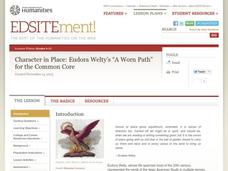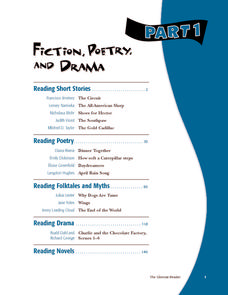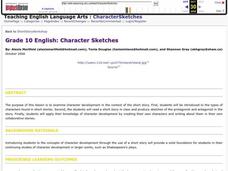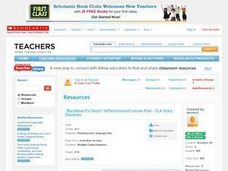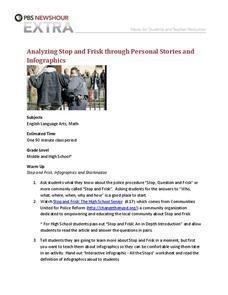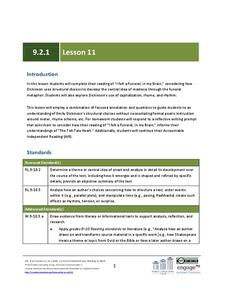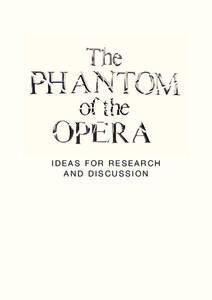National Endowment for the Humanities
Character in Place: Eudora Welty’s “A Worn Path” for the Common Core
How do writers use the interaction between elements like characterization and setting to create meaning? Readers of "A Worn Path" create a series of comic book-style graphics of Eudora Welty's short story and reflect on how Welty uses...
Curated OER
Analysis of Character in a Short Story
Ninth graders examine a character from the short story, John Steinbeck's, "Flight." students respond to questions about the story and illustrate the character's journey.
Curated OER
Fiction, Poetry, and Drama Part 1
Similar to a textbook, this resource includes multiple texts, plenty of explanation, lots of practice, and several graphic organizers. Use all of the materials, or pick and choose from such texts as "The Circuit," "Shoes for Hector,"...
Curated OER
Character Sketches
Young scholars are introduced to the types of characters found in short stories. They read a short story in class and produce sketches of the protagonist and antagonist. Finally, they create their own characters and write about them in...
Digital Writing and Research Lab's – Lesson Plans
Teaching Close Reading through Short Composition/Revision
This activity may have writers evaluate short compositions, but their subjects are quite tall: great Americans. Pupils read one another's compositions and closely examine how specific phrases and diction contribute to shaping American...
Curated OER
The Martian Chronicles: Concept Analysis
If you're planning on including Ray Bradbury's The Martian Chronicles in your science fiction unit, use a concept analysis guide to frame your instruction. It covers literary elements such as setting, narrative voice, and theme, as well...
Curated OER
Understanding Protagonists and Antagonists
How can you tell if a character is a villain? What about a hero? Work on literary analysis with an engaging language arts activity. After completing an activity about the four types of conflict, learners fill out a character map about a...
Curated OER
After Reading: "Plot the Plot" Activity in the Library Media Class
"Plot the plot" of "The Adventures of the Speckled Band" with your young readers. Take a few days to read Sir Arthur Conan Doyle's short story as a class or in pairs, having learners write down what they consider to be the most important...
Curated OER
Eudora Welty's "A Worn Path" in Graphical Representation
Students analyze graphical forms of Eudora Welty and interpret the shorts stories in the representations. In this graphical representations lesson, students analyze the short story genre in comic strips. Students then create their own...
Curated OER
Writing A Character Sketch
Middle schoolers are introduced to how a character sketch is an outline of a character that includes the character's outward appearance, family members, personality, interests, and beliefs. They then think of a character they would like...
Hampton-Brown
From "First Crossing"
Young scholars look closely at four tales taken from the collection of short stories, First Crossing edited by Donald R. Galloby. While examining the life of four teenagers and the lives they lead as U.S. immigrants, your enthusiastic...
Curated OER
"Blackbeard's Ghost" Differentiated Lesson Plan
Develop a better understanding of "Blackbeard's Ghost" with this differentiated activity. Working in groups on a creative project, middle schoolers can reinforce their reading comprehension and literary analysis skills. Use this activity...
Curated OER
Stephen Crane's "The Open Boat"
Students examine the relationship of man and nature as portrayed in Stephen Crane's, The Open Boat." The third person, omniscient point of view, the depth of character analysis found in the story, and the emotions evoked by the author...
Alabama Learning Exchange
Edgar Allan Poe's Journey Through Life and Literature
How was Edgar Allan Poe able to create "intriguing, memorable, and lasting literature"? To answer this question, learners analyze the syntax, diction, and characterizations in Poe's poems and short stories and compare the impact of these...
PBS
Analyzing Stop and Frisk Through Personal Stories and Infographics
How much can you learn about an important topic from a single image? High schoolers analyze an infographic that represents the number of stops performed during the Stop and Frisk police procedure. After building background information...
EngageNY
Grade 9 ELA Module 2: Unit 1, Lesson 11
The capitalization rules are strict and inflexible—until you experience the fluid beauty of an Emily Dickinson poem. Ninth graders test their existing knowledge of language arts conventions with the many bent grammar rules in "I Felt a...
Curated OER
What If: The Seed Of A Story
Young scholars read and comprehend a piece of fictional writing, analyze how setting, characterization, and plot affect the theme of a story and work in a group to create a new writing assignment. This 5-day plan culminates in students...
Phantom of Opera
The Phantom of the Opera: Ideas for Research and Discussion
You could spend a full day discussing The Phantom of the Opera and not scratch the surface, but a set of lessons about the literary elements and themes of the musical production is a great start. Young thespians build upon the background...
Curated OER
Out of the Dust: Questioning Strategies
Bloom's Taxonomy is a great way to address the many levels of comprehension. With explanations and examples of each level, you can create questions that focus on knowledge, comprehension, application, analysis, synthesis, and evaluation.
Hampton-Brown
Esperanza Rising
Accompany a reading of the novel, Esperanza Rising by Pam Muñoz Ryan, with a series of lessons that dive deep into the literary world of a young girl and the journey she takes to start a new life. Lessons and their...
Teaching Tolerance
Poetry and Storytelling Café
Academics take turns as actors in an engaging poetry cafe. Elementary learners work in small groups to create original poems or stories addressing community issues and read their work in front of a live audience. Scholars also reflect...
Curated OER
Poetic Elements
Poetry is all about sound and rhythm. The sound of the words, the rhythm of the lines, and the emotional atmosphere created by these elements and the literary devices poets use, compress whole stories into a few stanzas. The specialized...
Perfection Learning
I Know Why the Caged Bird Sings
A revolutionary work of literature requires a revolutionary assessment project. A series of activities on Maya Angelou's I Know Why the Caged Bird Sings includes discussion questions, a plot synopsis, and a selection of both short and...
Curated OER
Rudyard Kipling's Rikki-Tikki-Tavi: Mixing Words and Pictures
Create meaningful illustrations to accompany stories in a web-based art and literacy lesson focused on "Rikki-Tikki-Tavi" by Rudyard Kipling. The class takes a virtual art safari with the Museum of Modern Art and then discusses how...


